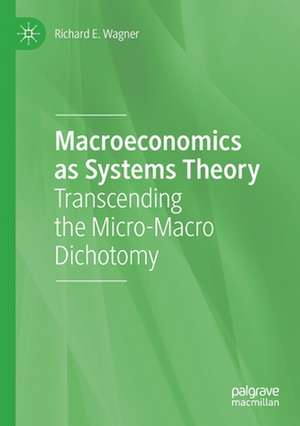Macroeconomics as Systems Theory: Transcending the Micro-Macro Dichotomy
Autor Richard E. Wagneren Limba Engleză Paperback – 3 mai 2021
Conventional macro theory presents a national economy as a collection of such aggregate variables as output, employment, investment, and a price level, and seeks to develop theoretical relationships among those variables. In contrast, the social-theoretic approach to macro or social theory in this book treats the standard macro variables as having been shaped through social institutions, conventions, and processes that in turn are generated through interaction among economizing persons. The object denoted as macro is thus of a higher order of complexity than the object denoted as micro.
| Toate formatele și edițiile | Preț | Express |
|---|---|---|
| Paperback (1) | 697.32 lei 6-8 săpt. | |
| Springer International Publishing – 3 mai 2021 | 697.32 lei 6-8 săpt. | |
| Hardback (1) | 699.77 lei 3-5 săpt. | |
| Springer International Publishing – 3 mai 2020 | 699.77 lei 3-5 săpt. |
Preț: 697.32 lei
Preț vechi: 820.38 lei
-15% Nou
Puncte Express: 1046
Preț estimativ în valută:
133.43€ • 139.31$ • 110.43£
133.43€ • 139.31$ • 110.43£
Carte tipărită la comandă
Livrare economică 04-18 aprilie
Preluare comenzi: 021 569.72.76
Specificații
ISBN-13: 9783030444679
ISBN-10: 3030444678
Pagini: 313
Ilustrații: XIII, 313 p. 10 illus., 7 illus. in color.
Dimensiuni: 148 x 210 mm
Greutate: 0.43 kg
Ediția:1st ed. 2020
Editura: Springer International Publishing
Colecția Palgrave Macmillan
Locul publicării:Cham, Switzerland
ISBN-10: 3030444678
Pagini: 313
Ilustrații: XIII, 313 p. 10 illus., 7 illus. in color.
Dimensiuni: 148 x 210 mm
Greutate: 0.43 kg
Ediția:1st ed. 2020
Editura: Springer International Publishing
Colecția Palgrave Macmillan
Locul publicării:Cham, Switzerland
Cuprins
1. Macroeconomics as Systems Theory: Setting the Stage.- 2. Models of Social Order: Mechanical vs. Creative.- 3. Structures of Production and Properties of Social Order.- 4. Diachronic Action within an Ecology of Plans.- 5. Kaleidic Economies and Internally Generated Change.- 6. Entangled Political Economy within Human Population Systems.- 7. Public Policy as the Political Calculation of Economic Value.- 8. Money, Credit, and Commanding the Societal Heights.- 9. Reason, Sentiment, and Democratic Action.- 10. Liberalism, Collectivism, and Democracy.
Recenzii
“I hope the prose and tone of my summary conveys how much I thoroughly enjoyed and learned from this book. … Wagner’s book provides researchers with a legion of avenues of research for others to help continue to push our science in these (more fruitful) directions and uncover the unseen realities that current mainstream economics hides from our view.” (Jonathan W. Plante, The Review of Austrian Economics, Vol. 35 (4), 2022)
Notă biografică
Richard E. Wagner is Holbert L. Harris Professor of Economics at George Mason University, USA. He has authored about 30 books and monographs and 200 journal articles across a diverse spectrum of subjects in economic theory and political economy. He was the founding co-editor of Constitutional Political Economy from 1989-1997, and he is currently a member of the editorial boards of Constitutional Political Economy, the Journal of Public Finance and Public Choice, the Journal of Infrastructure, Policy, and Development, and the Review of Austrian Economics.
Textul de pe ultima copertă
This book examines macroeconomic theory from an analytical framework provided by theories of complex systems, in contrast to conventional theories founded on aggregation. The resulting difference in analytical perspectives is huge: the macro level of society is not pursued through aggregation over micro entities. To the contrary, the micro-macro relation is treated as one of parts-to-whole, and this relation is approached from within an ecological scheme of thought. A society is a complex ecology of plans. That ecology, however, is not reducible to a single plan. Conventional macro theory presents a national economy as a collection of such aggregate variables as output, employment, investment, and a price level, and seeks to develop theoretical relationships among those variables. In contrast, the social-theoretic approach to macro or social theory in this book treats the standard macro variables as having been shaped through social institutions, conventions, and processes that in turn are generated through interaction among economizing persons. The object denoted as macro is thus of a higher order of complexity than the object denoted as micro.
Caracteristici
Provides a significant contribution to the debate on the essence and relevance of macroeconomic analysis Offers a novel framework for analyzing the macroeconomy, viewing it as a complex interaction among individuals, all of whom have their own individual plans Treats the standard macro variables as having been shaped through social institutions, conventions, and processes that in turn are generated through interaction among economizing persons
